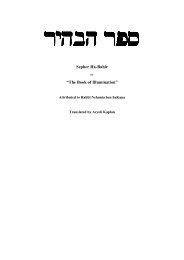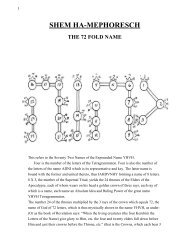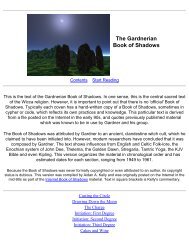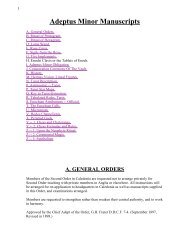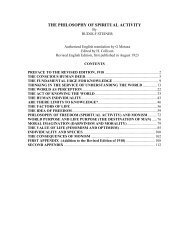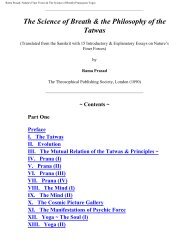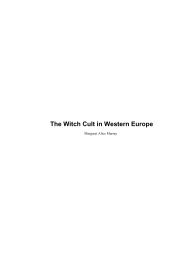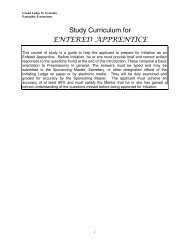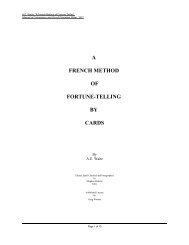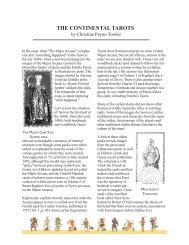Band 2 Anthropogenesis - H.P. Blavatsky
Band 2 Anthropogenesis - H.P. Blavatsky
Band 2 Anthropogenesis - H.P. Blavatsky
You also want an ePaper? Increase the reach of your titles
YUMPU automatically turns print PDFs into web optimized ePapers that Google loves.
intellectual struggle which has ended in the complete victory of the OEdipuses of Symbolism, it is not the Sphinx,<br />
however, who, burning with the shame of defeat, has had to bury herself in the sea, but verily the many-sided symbol,<br />
named Jehovah, whom Christians -- the civilized nations -- have accepted for their God. The latter has collapsed under<br />
the too close analysis, and is -- drowned. Symbologists have discovered with dismay that their adopted deity was only a<br />
mask for many other gods, an Euhemerized extinct planet, at best, the genius of the Moon and Saturn with the Jews, of<br />
the Sun and Jupiter, with early Christians; that the Trinity was, in truth, only an astronomical triad -- unless they accepted<br />
the more abstract and metaphysical meanings given to it by the Gentiles -- composed of the Sun (the Father), and the<br />
two planets Mercury (the Son) and Venus (the Holy Ghost, Sophia, the Spirit of Wisdom, Love and Truth, and Lucifer, as<br />
Christ, the bright and morning Star; vide "Revelation," ch. xxii., 15). Because, if the Father is the Sun (the elder Brother in<br />
the Eastern inner philosophy), the nearest planet to it is Mercury (Hermes, Budha, Thot), the name of whose mother on<br />
Earth was Maia; the planet which receives seven times more light than any other: which fact led the Gnostics to call their<br />
Christos, and the Kabalists their Hermes (in the astronomical meaning), the "seven-fold light" (vide at end of this §).<br />
Finally, this God was Bel; the Sun being "Bel," with the Gauls, "Helios" with the Greeks, "Baal," with the Phoenicians; "El"<br />
in Chaldean, hence "EL-ohim," "Emanu-EL," El, "god," in Hebrew. But even the Kabalistic god has vanished in the<br />
rabbinical workmanship, and one has now to turn to the innermost metaphysical sense of the Zohar to find in it anything<br />
like Ain-Soph, the nameless deity and the Absolute, so authoritatively and loudly claimed by the Christians. But it is<br />
certainly not to be found in the Mosaic books, by those who try to read without a Key to them. Ever since it was lost Jews<br />
and Christians have tried their best to blend these two conceptions, but in vain. They have only succeeded in finally<br />
robbing even the Universal Deity of ITS majestic character and primitive meaning.<br />
This is what was said in "Isis Unveiled":--<br />
It would seem, therefore, but natural to make a difference between the mystery-god [[Iao]], adopted from the highest<br />
antiquity by all who participated in the esoteric knowledge of the priests, and his phonetic counterparts, whom we find<br />
treated with so little reverence by the Ophites and other Gnostics.<br />
------------------------------------------------------------------------<br />
[[Vol. 2, Page]] 541 THE ANTIQUITY OF THE CROSS.<br />
In the Ophite gems of King ("Gnostics") we find the name of IAO repeated, and often confounded with that of Jevo, while<br />
the latter simply represents one of the genii antagonistic to Abraxas. But the name IAO neither originated with, nor was it<br />
the sole property of the Jews. Even if it had pleased Moses to bestow the name upon the tutelary "Spirit," the alleged<br />
protector and national deity of the "chosen people of Israel," there is yet no possible reason why other nationalities should<br />
receive Him as the Highest and One-living God. But we deny the assumption altogether. Besides, there is the fact that<br />
Jaho or Iao was a "Mystery name" from the beginning, for [[hebrew]] and [[hebrew]] never came into use before King<br />
David. Anterior to his time, few or no proper names were compounded with Iah or Jah. It looks rather as though David,<br />
being a sojourner among the Tyrians and Philistines (2 Samuel), brought thence the name of Jehovah. He made Zadok<br />
high priest, from whom came the Zadokites or Sadducees. He lived and ruled first at Hebron [[hebrew]], Habir-on or<br />
Kabeir-town, where the rites of the four (mystery-gods) were celebrated. Neither David nor Solomon recognized either<br />
Moses or the law of Moses. They aspired to build a temple to [[hebrew]], like the structures erected by Hiram to Hercules<br />
and Venus, Adon and Astarte.<br />
Says Furst: "The very ancient name of God, Yaho, written in the Greek law, appears, apart from its derivation, to have<br />
been an old mystic name of the Supreme deity of the Shemites. Hence it was told to Moses when he was initiated at Horeb<br />
-- the cave -- under the direction of Jethro, the Kenite (or Cainite) priest of Midian. In an old religion of the Chaldeans,<br />
whose remains are to be found among the Neo-Platonists, the highest divinity, enthroned above the seven heavens,<br />
representing the Spiritual Light-Principle . . . . and also conceived of as Demiurgus,* was called [[Iao]]([[hebrew]]), who<br />
was, like the Hebrew Yaha, mysterious and unmentionable, and whose name was communicated to the Initiated. The<br />
Phoenicians had a Supreme God, whose name was trilateral and secret, and he was [[Iao]]."** (Isis Unveiled), Vol. II., p.<br />
298.)<br />
The Cross, say the Kabalists, repeating the lesson of the Occultists, is one of the most ancient -- nay, perhaps, the most<br />
ancient of symbols. This is demonstrated at the very beginning of the Proem (Vol. I.). The Eastern Initiates show it coeval<br />
with the circle of Deific infinitude and the first differentiation of the Essence, the union of spirit and matter. This was<br />
rejected, and the astronomical allegory alone was accepted and made to fit into cunningly imagined terrestrial events.<br />
Let us demonstrate this statement. In astronomy, as said, Mercury is the son of Coelus and Lux -- of the sky and light, or<br />
the Sun; in mythology he is the progeny of Jupiter and Maia. He is the "messenger" of his Father Jupiter, the Messiah of<br />
the Sun; in Greek, his name "Hermes," means, among other things, the "Interpreter" -- the "Word" by mouth; the LOGOS,<br />
or VERBUM. Now, Mercury, besides being born on Mount Cyllene among shepherds, is the patron of the<br />
[[Footnote(s)]] -------------------------------------------------<br />
* By very few though, for the creators of the material universe were always considered as subordinate gods to the Most<br />
High Deity.<br />
** Lydus I., c. Ledrenus, I. c.<br />
------------------------------------------------------------------------<br />
[[Vol. 2, Page]] 542 THE SECRET DOCTRINE.<br />
latter. A psychopompic genius, he conducted the souls of the dead to Hades and brought them back, an office attributed<br />
to Jesus, after his death and resurrection. The symbols of Hermes-Mercury (Dii Termini) were placed along and at the<br />
turning points of highways (as crosses are now placed in Italy) and they were cruciform.* Every seventh day the priests<br />
anointed these termini with oil, and once a year hung them with garlands, hence they were the anointed. Mercury, when<br />
speaking through his oracles said, "I am he whom you call the Son of the Father (Jupiter) and Maia. Leaving the King of<br />
Heaven (the Sun) I come to help you, mortals." Mercury heals the blind and restores sight, mental and physical.** He was<br />
often represented as three-headed and called "Tricephalos," "Triplex," as one with the Sun and Venus. Finally, Mercury,




